bxl71
Naam
bxl71
About bxl71
Naar China gaan is voor mij een oude droom. Ik heb als grote filmfan heel veel Chinese filmen gezien, fictie en non-fictie boeken over China gelezen en verschillende cursussen op de universiteit gevolgd.
Onlangs ben ik mijn job kwijtgeraakt en ik had zowiezo een zwaar jaar achter de rug. Ik was al zeven jaar in Brussel (daarvoor was ik zeven jaar in Londen en daarvoor verhuisde ik elk jaar van land) en dat allemaal samen, heeft het heel gemakkelijk gemaakt om op de uitnodiging uit te gaan van een Chinese vriendin om naar Shanghai te gaan.
Ik was nog nooit in Azië geweest en was een cultureel gat dat ik als cultuur en kunsthistoricus, maar ook als mens graag wilde invullen.
Ik ben 15 februari vertrokken.
bxl71's blog
The House in Changde Lu
19.08.2008
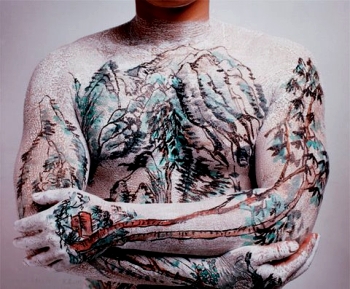
As of September 2008 our new premises will be home to contemporary art and thereby function as an extension of our current base at Moganshan 50. It will additionally aspire to be a meeting place for intellectual and social exchanges between artists, critics, art lovers and buyers. Thirdly, we want to it be a venue where at regular intervals dedicated collectors can gather and enjoy art and the inspiring company of fellow enthusiasts in the privacy and elegant comfort that only a historical home can offer.
So dear art lover, let us proudly present the Changde Villa to you. Although it will as of now house some of the most vibrant and challenging fruits of the contemporary Chinese artistic mind, the villa spaces will also allow these very objects to be contemplated in a rich historical context.
As you make your way through the exhibitions rooms, wood-panelled stair cases or through the windows look at the century old trees, you will be walking and breathing where many and very different human beings lived their daily lives.
After 1930, the year of completion of the villa, still surrounded by the expansive garden that has now disappeared, you would have been a guest to the British second in command of the all powerful Customs House, and his Chinese wife.
During the late thirties, the delicate steps and subdued whispering of well to do Chinese school girls, would have filled the house. As the famous Pen-wei girl school, the villa must have continued to be a place of high standing and curious wondering from the passer-byers in the street.
When current owner, a well-travelled and avid Shanghai-enthusiast from Hong Kong, bought the villa five years ago six families lived here. The house had been sold to six brothers of a reputed Nanjing military family after the Civil War.
Now it is hard to imagine the quiet spaces filled with drying laundry, six kitchens each dispersing their scents and sounds, and people young and old effortlessly manoeuvring through the dark and crammed corridors and rooms.
The harmony with which the extended family had taken possession of the spaces and the kindness, with which they guided him around the house, left the current owner with a lingering good feeling and a sense of peace and warmth-heartedness.
This is what we, the current inhabitants, hope to offer you in turn. Whether you are dropping in for a tranquil look at the art works, or are seeking professional advice or simply desire to exchange ideas with us, you are the most welcome guest of the house in Changde Lu.
| Bijlage | Grootte |
|---|---|
| Huang-Yan1_popup.jpg | 94.68 KB |
Shanghai calling August
19.08.2008

This is the last letter about Shanghai for now. Yesterday I landed in Brussels after a total of six months in China. Not nearly enough for a comprehensive survey of China, but a good amount of time for a first experience.
What I will do next is yet to be defined. My head is filled with ideas and wants. For the immediate future I don't think it will be again in Shanghai, which by many not seen as China, thought I think it very much is an integral and defining part.
If I want to, I can go back to the guiding company and to an art gallery in Shanghai, so if I change my mind, I will have work waiting for me. However the climate and the social fabric of both local and expat community have been pretty hard for me to bear…
The Art Gallery
I stopped my headhunting job at the end of July and instead of travelling the remaining week before going home, I decided to do freelance PR work for a contemporary art gallery. I was asked to look at the presentation and communication for their new space targeting high end collectors in an exclusive atmosphere.
It was a good decision which allowed me to have a peak at that hottest part of the contemporary art world.
Some predict contemporary Chinese art will soon be the most expensive one around. One reason is that the Chinese themselves are starting to buy it … and China has some of the richest people in the world and they like to spend money; a lot of money.
The prices of contemporary art are already pretty hefty by the way, so you need to have a bit of a nose to still find good bargains. And the Chinese artists readily admit that they produce art to sell and make money.
The gallery I worked for specialises in contemporary Chinese art and targets mainly Western buyers. It has one gallery in the famous Moganshan Lu 50 warehouse complex located a little north west of the centre of Shanghai.
Though Moganshan is puny compared to the huge and famous Dashanzi factory complex just outside of Beijing, it is still an impressive maze of studio's and galleries to go and explore and to let yourself be surprised and horrified (much violence and ugliness too) by young and old Chinese artists today.
I added some images of what I understand are the considered the top now and that I liked. I spare you the violent ones. Some seem to be unnecessarily sensational, but then I may not always understand what is going on. Ones that I do understand seem to be important to show, so I will give the ones I do not understand the benefit of the doubt. The ones that struck me to the core were large pictures of farm girls in full childhood bloom next red painted versions of the same girls with seducing smiles on hollow faces as young city prostitutes.
I saw them so often in the daytime in the massage parlours all over town. They always seem fined, just a little bored. So I am glad to be reminded by the artist that their situation is not ok at all, that our society is allowing this, and to please not get used to their situation.
I was lucky because the young French gallery manager recently opened a second gallery space located in a beautiful old Colonial house located in an up and coming area and needed an extra hand.
I even got to a little historical research and interview the owner of the house who told me much about the history of the house and its inhabitants. My version of the story of house, which the gallery wants to use for its website, is attached to this newsletter to give you an idea of the place.
As I reviewed the organisation of the gallery, I found that one of the main issues was the same as I experienced in other foreign companies in Shanghai; a lack of motivation and interest of the local employees in their jobs and the field they work in. There is no team spirit that works as one mind, with a clear, informed and therefore mutual goal to guide the whole project. These employees will not go the extra mile, which should make the much needed difference with the competitors.
Basically working with the wrong employees. You certainly can find motivated employees, but you need to be willing to search for them, be experienced in the Chinese job market, and be prepared to offer a competitive salary and future, and be a bit lucky, just like anywhere else.
In a small enterprise in a competitive area every person counts triple. And as I have noticed, an unwilling employee actually is a double burden. Work is unsatisfactory in varying degrees, and as others who tend to take over their work to ensure it gets done properly, or spend so much time supervising, it eats away at the productivity and morale of the efficient workers.
One day as I strolled around Moganshan Lu doing a bit of research in the little art bookshop, I noticed that in this more established contemporary art scene in China, some people have such a similar look to people in the Western art scene.
Tall and bold older men dressed in black with dark-rimmed designer glasses, male artists that look like over-aged rockers, overdressed female gallery managers and art related freelancers, and underdressed female artists.
We find this normal now, but I always catch myself being surprised to see old photographs of earlier rebels like Van Gogh, Matisse or Freud for that matter, looking much like their contemporaries; with the revolutions in their heads and in their behaviour.
In the bookshop itself, I continued to notice how China has fully joined the international community at the high end with dozens of beautifully edited glossy art magazines, fully in Chinese, so purely for the home market. These big glossies are not cheap and an indication of the recent trend of wealthy Chinese turning their attention to buying cutting edge Chinese art.
Besides about 50 different art magazines, there were many beautiful hardback editions of Chinese art. The whole set up is for the more well-off. A cup of coffee cost me €3 just like in the western Starbucks and Costa coffees all over town.
Geography lessons
I am not sure why I started doing this but since the last month, in friendly exchanges with Chinese, I found myself drawing the map of Europe quite a few times. It was always when Chinese asked me where I was from and me seeing that the word /Belgium/ left them racking their brains.
It is painful for them not know this, as they feel it is offensive for me to be from an unknown place. So starting to draw immediately distracts the attention from the embarrassment. It also always seemed to create a good atmosphere, and I found it to be a great way to generally communicate and make up for my lack of Chinese.
As soon as I started drawing a crowd would gather. In the beginning it made me feel awkward. For people I had not started the conversation with to come and stand right up close to us or even hang over my shoulder, I felt was impolite.
But that is the way people are in China and it is not considered impolite at all to join a discussion or a display. Groups are good, even if you don't know each other, especially if there is something fun or exiting to share. And I was very grateful to them for including me in these moments and thereby for me making up for all those other moments when I felt uninteresting or simply invisible.
In their usually poor English people would make big efforts to talk to me and try and make the conversation last. When my Chinese and their English were depleted, we would just smile and sit next to each other. And it did not feel uncomfortable because the atmosphere was one of gratefulness.
Giving my geography lessons in a bank one day, I found out how to tell men where I am from! It is the country of Formula 1 in Francorchamps!
My colleague at work by the way only recognised Belgium and France on the map. What surprised me the most was that she did not recognise the UK or Italy. I have no idea what foreign geography is learnt at school in China.
The last day of my stay I spent three hours in the bank trying to make an international transfer and close my account. One of the information officers, a job student, came by several times while I was standing at the counter to ask me how I was. Every time he also apologised that he could not help me and that unfortunately this bank had little experience in international transactions.
On the matter of connecting with people, I had a great personal connection that worked miracles to get them to overcome their shyness and talk to me. My grandfather from my mom's side was an amateur cyclist and champion in the former Yugoslavia. He participated in the Olympics of 1936 and that fact certainly was worth gold in China this year.
Impression of a walk in Luxun park in Hongkou, a district in the north east of Shanghai
(Luxun is* *one of the major Chinese writers of the 20th century, considered the founder of modern vernacular Chinese literature, maybe what Pushkin was for Russia?)
Looking for a quiet spot to read a book or take a nap? Forget doing that in a Chinese public park. It is the opposite of the ancient gardens, like the famous Yu Gardens in downtown Shanghai, that were specially build for intellectuals to recharge after a day full of political intrigue and the tiresome string of rules and regulations that paced their every word and action.
Public parks especially in the weekend are packed. There are food stands and sometimes even little shops. There are attractions of all sorts. The larger ones have fairs and stages where loud life music is played. Meanwhile privately performed music and song is all around. People with ancient and modern instruments play alone or in group often holding sheets of music and reviewing them together.
Then there are the singers. They are not only of a varying degree of voice quality, but, as they love to sing with a microphone, you need to listen to varying degrees of amplifier quality. It is safe to say that most of these technical aides are of very bad quality. Hence the cacophony… everywhere! Naughty children make no chance of being noticed throwing tantrums here!
Last but not least are the groups of genuine enthusiasts singing old Revolutionary songs with full force. I don't know whether they believe in Communism (I think only about 7% of the Chinese are member of the Party), but I have heard that people do miss the fever and sensation that the mass singing produced.
Final note on Food (until the next one of course)!
So what has my most recent month here been like? The most exiting feature has been that the Chinese language has finally started seeping into my brain. I understand snippets of conversation in the street, on the radio, in the subway ... I am finally managing to converse or at least make myself understood by the taxi driver sufficiently to have a giggle together.
Eating loads of Chinese desserts!! I have discovered sweet green tea and red bean paste filled pastries, mango and coconut soups with rice (white Chinese and black Thai rice), sticky dumplings with sesame seeds or crushed nuts, deep-fried vanilla pudding with something crunchy in it (never found out what it was) and much more… just criminal that these places do not have espresso (I know I am heretic in Chinese eyes).
Another of the so many food discoveries was a Heilongjiang restaurant to which my Chinese student of English had invited me. Heilongjiang is the most Eastern province that borders on Russia and part of the historical Manchuria from which the Qing, the last emperors, originated. It literally means the Black Dragon River, which is the Chinese name for the Amur River.
I ate a type of sauerkraut but very gentle in taste, I ate the most delicate meat in aspic sprinkled with tiny bits of raw garlic and fresh coriander, dumpling with fresh green herbs, and the best: stewed meat with bone marrow, meat falling of the bone in a subtle brown sauce that tasted slightly caramelised with a hint of a woody spice (cinnamon or allspice?).
The restaurant was in the middle of an all Chinese residential area, so of course, I was the only Western person there.
During dinner Louis (I don't know what his Chinese name is), as usual, was both entertaining and instructive. Working for China Shipping, an internationally operating government company, he has inside stories I don't hear anywhere else.
I know now that he often has meetings on Saturdays, and as in many other government companies, the work rhythm has been seriously increased. It is one of the changes in the last years that meant to make the companies more competitive.
Also you do not need to be party member to be working for state-owned company, and CP members get investigated for bribery just like anyone else, although usually the big fish still get away.
He was just about to leave the next day to the north of China to lead the bi-annual audit in the Northern branch. He said that every year 2 to 3 three people got caught and sent to jail for fraudulent practices or bribery.
The last day
The last night in China I stayed in with a friend to watch the opening of the Olympic Games. I had made a salad of the last of the fridge content, which caused the fireworks on TV to be resonated in our mouths. A large green pepper that to me had looked much like an ordinary green veggie pepper out to particularly spicy relative!
We watched the extraordinary show with mixed feelings, like I guess many of you did. We know what effort, money, and paid and volunteer work has gone into this. In the mean time, among other things, at less than 100 km outside the large cities, many farmers are still without running water, heat and are pretty much at the mercy of local officials who pocket subsidies meant for farming.
Also many Chinese, who have ever protested or opposed government policies like being thrown out of their houses, have been rounded up and thrown in jail for the duration of the Games as precautionary measures. And so on.
Still, it was a show to behold.
What a shame then to see the Olympian athletes parading the grounds, waving one hand at the audience and holding a camera or a mobile phone in the other and babbleling to each other. It made them look more like a bunch of package holiday tourists than noble ambassadors of a universal mission to bring peace among all people.
They must have wanted to compete with the stiff-armed waving and clearly bored state officials, for spoiling the sought-after elegance of the Games. Good thing that some athletes, as I remember especially those from poorer nations, showed the uncontrollable smile of pride or the serious look of the importance of the moment. And trying very hard to be as dignified as possible under all the obvious excitement and incredibility of been there.
Watching the show also made me very conscious that despite all the mass orchestration of human beings, the naked display of technological machismo, and the brightly coloured and omnipresent nationalism of China, I can vouch for the fact that the government does not control their citizens as they once did.
Women, usually what look like mothers and daughters (of all ages!), and girlfriends, walk the streets holding hands. Lovers shyly kiss in public. At lunch and in the evening the restaurants are packed with large groups of people eating together, usually in a very animated atmosphere and making a lot of noise.
Someone eating by themselves is rare, though you see them during lunch in the area of offices. A western feature creeping in along side the "modernisation"?
The indifference and impenetrability of the Chinese, indispensable qualities for survival in the terrorising times of Communism that got mixed and melted in centuries of drilled Confucianism, left the world with a China that is bewildering on the human level. There must be a sentence referring to this communication barrier in all my letters and in all the letters of all that have ever visited China.
Meeting Chinese who studied and worked abroad will facilitate communication and you learning Chinese will help a great too. These are dedicated (and often costly) efforts that either or both parties need to want to make.
Yet never forget, and though I mentioned this before, and we all know this, that the cheapest and oldest manner of communicating that is charm.
Charming people is what my last visitor excels at. It was a delight to take him around Shanghai, to meet my Chinese and Western friends as well as local vegetable merchants.
The photos that are added in this newsletter are all taken by my dad or of him. Smiles all around. Just flick through them and enjoy the warmness of human contact. No words needed, just the heartfelt willingness to be up and close.
http://www.new.facebook.com/album.php?aid=46600&l=b01e3&id=721010856
….
As I entered Terminal 5 in Heathrow, I had a bit of flashback. I have never been there and my first reaction was to think I was back in China. All bright lights, nothing but shopping (and much of it luxury) and food. As I looked down to the lower level, I saw what must have been about two hundred people trying to make the best of what seats where available to make a bed and sleep. There was almost no one in the shops. Even the staunchest shoppers amongst us were apparently defeated by travel fatigue.
For a terminal where many people have to sometimes wait hours for connecting flights, a few less Gucci bags and a few more long chairs in segregated quiet areas would have been very welcome.
….
I am having a fresh amber draught beer with my flatmate in a new pub on the market square of our neighbourhood in Brussels. The high and large windows allow the feeble summer sun to illuminate our grateful faces.
There is mellow music in the background as we listen to each other's stories, but I especially see her happiness to have me back, and I know she is looking at mine.
bxl71
| Bijlage | Grootte |
|---|---|
| Chen-Lingyang_popup.jpg | 31.54 KB |
Shanghai calling June
24.06.2008
Dear all
The heat has been coming our way; hot and humid as many Shanghai veterans predicted me it would be with a sarcastic expression on their faces. Why oh why does it make people feel better to find out that yet another fellow human being is going to join them in a particular suffering? ... and this is just the beginning, July and August are the real deal.
Luckily, often enough, a pretty strong breeze blows through the streets and for now still cools us as we walk to get our lunches. It does however also blow the dust of the Eternal Building sites in up in the air. A few weeks ago I was particularly unlucky and got quite a bit of grit and dust in my eyes. You should be wearing goggles if you were contact lenses I suspect!
I spent a painful first hour at the office trying not to rub my eyes that were hurting like mad. Now the rainy season has begun so the dust is less of a problem. Or so it seems. Leaving your windows open in the house, which is vital if you don't want your shoes and clothes to become a mould fest, you notice that the dust is still flying around.
In addition the sweet company of mosquitoes keeps reminding us that Shanghai was build on a swamp. Fortunately the big supermarkets now sell the little devices with tablets that you can plug in the electricity socket, freeing you from burning a coil all night close enough to your face to keep them away from there, which can leave you with a pretty dense headache. I do miss the elegant mosquito net above my bed at my parent's friend's estate in the Caribbean island of St Lucia. Of course expats staying in fancy compounds and luxury hotels have no such troubles. All is regulated by air co and windows often remain closed all the time.
Still, mosquitoes and humid heat on a late night in a leafy garden of an art deco house in the French Concession (unfortunately not mine!) or a terrace of bar along the Bund with a view of the Huangpu River (not every night for me!), are part of the experience that often times makes you feel in an old movie or novel. No air-conditioned room can offer you that same sensation. It is in tree lined wet streets of the inner centre of the French Concession, where Chinese and expats really live side by side and shop in some of the same shops, where you have to deal with Chinese plumbers and landlords yourself, that I feel most grateful for being here. This is where I would not be surprised to meet Humphrey Bogart coming out one the old lanes. The sort of alley ways that when you peek through the open gates you can only see the central walkway onto which more lanes and all the habitations are attached to. You see some bicycles, sometimes the odd person, overhanging laundry, but you can only guess how deep and extended that particular lane is and how many and what kind of people live there, what little businesses are set up in there.
I regularly enter them, since I have noticed that no one seems to be bothered by it, especially when you say hello and smile.
The lanes used to be the fabric of Shanghanese society, but as people have become richer they move to more private quarters and are replaced by migrants. I spoke last time of the social fabric change in 1949 and following years, when the communists "nationalised" all private housing and forced people to cohabite, rich and poor, mostly locals, but also immigrants. Since the economic boom, which for Shanghai was unleashed in the early 90's, a steady stream of migrants has entered Shanghai and the surrounding area benefiting from liberalising tax and other regulations.
Migrants here are the Chinese economical "refugees" from other provinces. They often speak different dialects, eat different foods (very different!) and share beds in rotation if they are extremely poor, which is often the case. The result is that the poorest in Shanghai, certainly when older, share the tight lane accommodation without the traditional benefit of being able to share and support each other. They are strangers to each other, and both older Shanghanese and migrants are liable to not being able to master the nationally imposed Beijing area dialect, Mandarin. So economic development has much like the creation of the People's Republic of China in 1949 and only 40 years later, again shaken society from top to bottom.
Last Saturday, I guided a group of 2 American and 1 Australian business leaders (Corning!) enrolled in the Tuck Executive Program doing nine months around the world with an assignment relating to their respective jobs. We walk around Shanghai for five hours. When I prepared the tour and summarised Shanghai's recent history putting all the pieces together also for myself, it is just makes it even more impressive what Chinese people have been through in just the last 150 years. Western colonial foreigners, Japanese invaders and Chinese leaders really can compete with each other on the degree of force imposed on the population, the first in terms of 100 years of racial injustice and slave labour (often in cooperation with a equally cruel Chinese mafia); the second imitated the first one just before and during the Second World War, and the third ones imposed terror mental and physical in the name of the greater good for all and the more recent changes in a free for all survival of the fittest.
For those at home still surprised or horrified at China's reaction to the West on many issues, I only repeat that we still cut a pretty bad figure here on many accounts. Both in business, complaining about improved labour laws (for the workers), often refusing basic salary pay raises especially in sales, arrogant behaviour, glass ceilings for well educated managers, bringing low cost factories, and most visible of all, the increasing import of ageing men who, date women so young and pretty, that by the look of their waist size and looks, they could only dream of them at home.
I have recently heard of a highly paid American lawyer being fired for using abusive language to Chinese personnel, but I think that is an exception.
No westerner comes to my HR firm with the brief: get me the best in his field, money is not an issue. What do we expect China to do for us, if we are prepared to give so little in return for big returns? Why do we still have double standards when dealing with humans and business, when we are the ones preaching the loudest about democracy, equality and the good life for every one on earth?
I really cannot make up my mind of where this country is going to and where the relations with the outside world are heading too. The most genuine relationships East West I see here, are friendship between women, Chinese and foreign. Chinese men are far less likely to strike up friendships with foreigners.
The sexual relationships, with very few expectations all Western man- Chinese female, most agree, are almost all physical-material "win-win" situations heading nowhere as most men, young and old, stay only short periods of time and only very few marry. Maybe I am too cynical, and things are improving as more Westerns move here, however as the partnering is rarely with "common" looking Chinese girl, so I remain sceptical!
Business relations are trying and ever tested.
A lot of things drive me crazy here. Much of it is because of to me inexplicable Chinese behaviour, both in my professional life, as in my private life. It can make you feel intensely lonely and lost. It is not without reason that the French Concession with its European history warms my heart. I would lie if I did not admit that I recognise and am comforted there.
A China old hand from New Zealand told me that I was not an exception; he had seen grown men cry out of sheer desperation in China. He himself here for 20 odd years, made sure he took long holidays on regular intervals. He needed this to remain here however much he loved China.
If I can advise one thing to the ones of you who which to venture out here on their own, it would be to try and get a solid notion of Chinese in before you come. I am all good with all my historic knowledge, but it is the use of the language that could really get me ahead here in understanding the locals.
So summerise: I find life pretty difficult here, but I should not be surprised. I want it all: understanding Chinese people, get to know them better, but I came here woefully unprepared and now I feel like I am drowning.
Luckily there are plenty of fun moments too and I have lovely Chinese and Western friends, so I am still breathing!
HR:
Some news on the HR side of things from my professional activities: currently 6 million Chinese youngsters graduate from university each year. China faces some of the most complex human resources challenges in the world today. The country's workforce is growing at 11% per year. However, it is expected to start shrinking after 2015 and by 2050, due to ballooning number of elderly and decreasing number of people born after 1979, close to a third of China's citizens will be over 60 - three times the current proportion.
Up to 30% of young graduates will not find a job in the first year. At the same time, foreign companies are not finding the kind of skilled labour they require. One of recurrent complaint from foreign companies is the lack of problem-solving capacity in new recruits. A second one is of the legal kind. The new labour law better protects workers but simultaneously limits the opportunity for short term and interim contracts which can great job opportunities and allow start ups to get their feet on the ground.
I would again say that the lack of good English and the lack of mental flexibility are real obstacles. But these are especially true for smaller companies like the many of the customers of the recruitment company I work for. I recently realised that the larger companies with sufficient funds to hire the cream of the crop and with rigid personnel structures are much less subjected to these problems. Unfortunately as far I can see, there is no organised or centralised help or information for smaller foreign companies from an EU governmental standpoint in China to find their way through the legal and mental obstacles courses. If being very cynical, I am still trying to find out what exactly the benefits of the Chamber of commerce are, bar offering network opportunities and workshops. In addition their memberships are expensive and the same for everyone, so relatively much more so for smaller fishes, and prohibitive for single individual trying to setup business here. What is really needed here is a much more comprehensive service to Chinese law and local regulations that are ever changing and corrupt. A common approach might force local authorities at least not to apply laws according the weather on a particular day and give smaller entities some protection. And this goes for private individual as well as for businesses. Let's not forget that the word is that many come to China, but few make a profit.
Titbits:
A massage parlour next door has very interesting menu. Apparently there is something called "Belgium Volatile oil massage".
The local newspaper has a column with newly invented words in Mandarin. I selected some for you as it gives an idea of is new and thus requires naming. It also show, creativity and not just copying is a Chinese feature.
* Boss shortcut key (loabanjian): used by internet users to quickly hide or close software or Web pages they don't want the boss to know they are browsing at work
* Tomb for the living (huorenmu): Many rich people have built tombs for themselves or family members in a country in the Three Gorges Dam area. Building tombs for oneself or living family members has become a status symbol in some places in China.
* Agflagation (nongye tongzhang): A blend of agriculture and inflation. It refers to the inflation driven predominantly by rising prices of agricultural products.
* Hitting a wall in job search (juwuba): refers to job seekers who are repeatedly turned down by employers. The expression came from another word which originally meant megatro transformer in Japanese cartoons and translates as jumbo.
* Zero Training (ling peixun): Unemployed people who have never received any professional training for a new job.
Travels:
I have travelled to Beijing and to Xi'an with Lucy, but that will be for a next email due shortly with pictures!
For now just some pictures of Shanghai life.
*Pudong by night,
* the lanes hosting art shops in the French Concession and Western style bars,
*the museum of contemporary art
*and the marriage market in the park where parents advertise their child on a piece paper looking for an appropriate partner - all with a lot of laughter and big smiles!
.jpg)
.jpg)
.jpg)
Greetings!
bxl71
| Bijlage | Grootte |
|---|---|
| Lucy in Shanghai (5).jpg | 98.87 KB |
| Lucy in Shanghai (10).jpg | 75.17 KB |
| Afternoon with Anna (2).jpg | 84.58 KB |
| Pudong by night.JPG | 30.8 KB |
On a more thoughtful note from Shanghai
10.05.2008
Many people have asked me about the Tibet, the reaction to the French and what I think of the Olympics. Firstly I am personally feeling the effect the China-bashing has had. It has become a good deal more difficult to get a visa, both work or tourist visa. Where previously you could make a trip to Hong Kong to get your paperwork done, now you now need to go back home. Or least officially you do. Friends have tried to go to the Chinese embassies in Japan and Indonesia and so far they have been lucky. No so for all, many are refused and need to go back home. And it seems to be irrelevant whether you have been here long or not, diplomat or not, owner of a business in China or not. In that China has been nicely communist!
I myself am going back to Belgium next week to get my visa.
But these are inconveniences, not life threatening actions. China is flexing its muscles to show the world it is not be taken for a finger pointing ride. I am going to try and give my view on this though I must say, I hope to be able to hear more from my Chinese friends on this. They have not broached the subjects themselves and I don't know yet what offends and what not. This is what I do know.
A lot of people, from I gather from newspapers local and international, both living in China and abroad, are angry with Tibetans and think them ungrateful. And they are angry for foreigners judging them to support their government. Clearly shooting and imprisoning humans for voicing their heartfelt wishes and opinions is never right. It is also not clear to me how much ordinary Chinese believe or know what is actually happening in Tibet. I have the feeling their disbelieve of CNN and anger at France is a mixture of hurt national pride that stems from seeing them (and they feeling) as a cheap and obedient goods producer, inferior less educated and world-wise people, and the other hand from a sort of cheated love relationship. They adore much of western culture and are the most fanatical brands fans (and buyers!) ever. But we constantly point out that they are nothing like us and don’t even do the basic things right.
But I have yet to read an article that tries to understand and begin to explain why millions of ordinary Chinese people feel this way. Why they feel such violent action is OK. These are people who are not like twenty years ago simply indoctrinated, that is too easy an explanation. We are talking about people that even thought obviously many restraints and restrictions remain, rush trough a life that is so modern, in constant radical change and fast in some places, that many of you would feel totally in out of your depth and unable to keep pace. If you think this is a place where people cannot think for themselves you need to think again. I am not playing the devil’s advocate here, but living here, is even more a realisation of how high the flag of hypocrisy flies in the West. We are excellent at finger pointing and we don't pull that many triggers ourselves (we makes plenty of weapons though), but it makes us no less bloody and violent.
One thing that I heard here and not anywhere else, but maybe I am just ignorant, is that before China came into Tibet, most people were serfs of big land owners. However they live now, it is unlikely it was better before. Again, the attempt to extermination a culture for an artificial greater good has no justification in human terms, but I have the impression that many Chinese genuinely believe that they went into Tibet and have been aiding Tibet with good intentions. And guess what; haven't we heard this before and quite recently from our own politicians’ mouth? And how many civilians died for the greater good a foreign concept in Iraq?
I must say that I find the situation not so clear cut as many people make it out to be. Firstly the Olympics being a beacon of international harmony, fairness through amateurs’ sports is a hoax in itself. There is so much money wining and dining involved, many top sportsmen and women participate, and it has disciplines where little under aged girls participate, who have trained so hard, in other circumstances it would be considered child labour (I know most people don’t see it that way, but it has always bothered me because the whole idea and design is by and for grown ups).
We want our cheap stuffs to be made and dirty industries to be done in China at cheap prices, but we want China to care just as much as us on environmental problems. One of my Chinese students, who is a pretty senior manager in a government owned company, pointed this out to be when we were reading a series of articles on China in the Economist. I was asking him why the government is not tougher on environmental issues if it can manage massive projects so efficiently if it wants to. Shanghai itself as we know it now is barely 10 years old. He laughed at me and he was right too. I have rarely felt so embarrassed. So I guess all the above, comes from a genuine effort to understand this place and its people. They amaze and frustrate me everyday. I thought Brussels was chaotic in heart and soul, but this is something else.
However much I try to I still feel I judge too quickly here and I do not know enough of the others' reasons for their behaviour. My Chinese student is really my teacher and he knows a great deal more about my world than I know of his. I feel I should pay him.
One cultural consultant I met in Shanghai has taught me a very simple technique for surviving in China: Stop Watch Listen Learn. Every time you make an assumption, put it aside and reconsider, be open. And be humble. The fact is you are very likely to lack the knowledge and experience to judge what a Chinese person does and say. And it is not anybodies fault. But unless you keep remembering and accepting this, you will feel frustrated angry and often finally self-righteous because it is very difficult not to think "why don't they understand this or that" usually something you think is very self-evident, while you should be thinking” why do we not understand each other better". I keep on hearing expats saying why this why that and have caught myself saying it too.
For me I have decided that part of my cultural knowledge is a solid part that I can keep on building up and replacing in parts that I feel have become obsolete. Another part is a floating entity. It is inhabited by thinks you don’t understand or thought you have come to understand but that gets challenged radically enough and often enough to make you wonder whether it is not the opposite of what you thought. That part I feel, you need to deeply respect, not give up on and especially accept its existence (sometimes its very large size!). And I think these two parts exists in any relationship.
From all the places I have been so far, and sure there are very many places I have not been, this is the one I think is the best for a Western to reassess him or herself. Yesterday I heard something that I should have known being an historian. I will start working as a freelance city guide soon and have been following the most senior guide a few times to learn from him. Yesterday he brought us to a little alley way to show us a large stone gate. As all building materials, aside from mud had to come from abroad, this gate was an obvious sign of wealth. It led to fairly large inner court yard that was littered with bicycles, buckets and the most ingenious constructions to dry laundry. This used to be for one family until the Communist Government came in 1949 after the occupation of Japan and thanked the family for giving their house to the people and allowed them to choose two rooms and let in several other families allocating each two rooms.
Toilet, kitchen, inner court yard and stairs became common properties.
Mostly likely that shortly after this the original family had to undergo various humiliating actions to be re-educated and cleaned from their aristocratic and capitalist spirit and body and that they were now living with farmers from other provinces having next to nothing in common with them, probably speaking radically different dialects.
Everyone older than 25 in Shanghai has lived in this kind of shared environment as there was simply not other accommodation. So the guide reminded us, when faced with HR issues at work, a direct or seemingly impolite or indifferent reaction from a Chinese colleague, to think of this. How many times do we say or hear someone say they need their space? There are 1 billion Chinese individuals who grew up without the word privacy in their vocabulary. I have only heard one sympathetic or aware comment on this subject since I have arrived. A Slovak guy who said that much of what he saw and experienced here reminded him of home in the sense of the dynamics of what sudden and radical social change brings.
Next week I am due to do a course for managers with local personnel. I hope it will as interesting as it promises to be, because I think my colleagues deserve me to do my very best to understand them in their own country.
--
Lujiazui Pudong, Shanghai
Good morning all from the city of the ever clouded sky
09.05.2008
I am sorry not to have written earlier, I know some of you have been wondering when the next one was due! Work has been more busy than usual as one consultant was travelling for three weeks and another was ill. But that was good for me as I got to do new assignments and learned more about the HR consultancy business.
Again, there is much more to tell than what follows below, but I hope nevertheless that I choose some interesting topics. As I did not have much in the way of free time, there are just a few pictures this time. The last one needs no comment, just to show you this is a normal sight in corner shops that are everywhere in town.
There is however a document attached this time. I wrote it in
one go and I was not sure whether it would interest you as it is a more opinionated piece and would make the news email to long. So feel free to skip it.
If you do want to make a personal comment, you know it is always nice to get some feed back.
Air Grade C - Hospital de luxe
After a little health dip earlier this month, I can say I am pretty much back on the Shanghai track. I was exhausted and my body just stopped. As usual I was going a few too many things at the same time!
I have tried making some adjustments in my daily routine and that has helped. I have cut down on the amount of exercise I was doing, and in an attempt to avoid the worst of the pollution and dust, I am trying to make sure I don't go out too much in the middle of the day. Of course Shanghai is a perpetual building site and although it is not legal, often the building continues through the night. There is a number you can dial to call the police so they go and stop the works which they do do, but that does not seem to deter building sites from trying.
Someone told me that the sky is grey here because the dust particles of the entire continent are blown to China. So it is amongst others, Belgian dust, that is the reason Chinese paintings and scrolls always have a grey or muted brown sky. It sounds very good, but I can't help feeling smog has something to do with it too.
Since a few days the sun is breaking through, or at least, the rays of sun hit the ground even though the sun itself is not visible. Still, living in Shanghai you get a pretty good deal compared to the people living in Beijing and some other large industrial towns. Although the Olympics, for all the critique of having allowed it to be in China, has had the result that there has been a phenomenal effort to clean up Beijing (albeit for the wrong reasons namely pressure from outside). Of course there is still much to do, but apparently the result is quite spectacular. In some parts of Beijing people are for the first time in their lives hanging laundry outside and leaving windows open.
Maybe the Gods of Journalism put something in my drink to make me land in hospital, because it was quite an experience in itself. I would certainly recommend being sick China, that is, if you have one of those "Tiffany" health insurances, that expats have little choice but to subscribe too. I luckily did just the week before needing treatment.
I went to a hospital which was affiliated with my insurance and part of local hospital but with a separate entrance and staff. I was immediately helped, had the principal doctor and director, who guessing from his attire and accent, was straight from a remote corner of the United Kingdom, checked up on me three times. At night one other doctor, a petite Indian lady doctor who more than made up in elegance, beauty and British-ness for her boss, visited me. And a third doctor, a very likeable down-to-earth rather chubby American Chinese guy, who could not get used to Shanghai's climate or China's food, called up on me before checking out for. All the while a battery of nurses took care of me in a room that was more like a hotel than a hospital room. All this, although I only stayed there one night and had not been in need of surgery.
The food I had to order, and it goes directly on the hospital bill, from a restaurant menu as they don't serve food for expats. I guess they think expats never eat local food or perhaps the hospital food is not considered trustworthy by the insurance companies? So I had pasta from a local Italian restaurant in the evening and McDonald pancakes in the morning. All very good, although the pasta was a suspiciously close relative to the local thin noodle. The coffee was excellent. But then so was the bill; nearly 800 euros. One of my Chinese friends has promised to come with me next time I need to go and we will check in the Chinese side for 10 euros and see what happens with me (and a few more Chinese people). I have been meaning to try Chinese medicine anyway and there are some hospitals famous for it in Shanghai.
While laying in my smooth bed, I watched some TV which I rarely do at home. The only English speaking Channel was ICS, international channel Shanghai. One of the programmes features was about the luxury goods business. It is becoming so big in China that several Chinese universities have added a master of Business concentrating on the Luxury Goods business to their curriculum. China is now responsible for 18% all luxury goods purchases. Not too far away from my home, there is shopping complex that calls itself, Super Brand Mall. It does take much guessing to know what is sold there. Step in and you feel like to entered Old Bond Street and Rodeo Drive all mixed into one. Toilets are clean, for free and in some malls they much look like designers hotel toilets with gorgeous tiling, hand crèmes, perfumes, and combs.
The universities are taking this very serious, as you do when obscene amounts of money are involved. Foreign professors are invited to join the teaching staff and courses are given in English.
Another TV programme was on artists searching for peaceful and harmonious ways to live. Several travelled to Tibet, both Chinese and foreigners, to finally stay there. Others decorated their houses in Shanghai to transform them in temples of pastel colours and gentles shapes. Sitting in my 800 euro room, watching programmes on luxury goods and the search for inner peace, I was miles away from much of the Shanghai outside my doorstep.
For sure, next month, my number one aim is to get out of Shanghai again. In the visit of my friend Lucy, I could not have a better excuse not to check work emails in the weekend and to go and hike in the bamboo mountains and climb some big wall to check out which barbarians are at it again this time.
Chinese Wedding
Two weekends ago I was invited to a Chinese wedding. I did not know the people who got married very well, so I was depended on our mutual good friend Flora to help me prepare for this happening. Flora is one of my language exchange partners who became a good friend. She studied and lived in the UK, so she is an excellent cultural guide. The couple is the same one I accompanied to buy wedding dresses a few weeks ago. So it was nice to also be there and see the result of the fasted dress shopping I ever saw.
I was told not to dress up and not to bring a regular gift. Everyone brings money in a red envelope, which is marked with the donor's name. When I arrived at the restaurant where the wedding took place, I was one of the first ones there. A huge poster of the couple graced the entrance next to a large desk where guests could sign in on a large red scroll with a golden pen. Now they have a guestbook with one signature in letters next to all those beautiful Chinese characters. I tried to write in my prettiest handwriting but it still looked pretty plain next to all the other writings. They, however, will cherish the fact there was a foreigner at their wedding.
The huge groom immediately appointed one of his former school mates to escort me during the day, as he spoke very good English. Funnily enough, the little guy was totally thrown because I was fully at ease with the ritual, the people and the food. He could not get over it that I ate everything that was served and with chopsticks. Working for Caterpillar, he has apparently only met foreigners who stay clear from most Chinese food and rarely leave the expat community. He has not been very lucky, because I met quite a lot of expats who enjoy the food, the language and the people. Fortunately! I did, however, put my foot in it when I poured my self a glass of wine from the bottle that was meant exclusively for the couple.
The wedding itself was a strange affair, mixing Chinese and Western tradition. All together not my cup of tea. The couple is actually already legally married which is an uninteresting formal procedure that is not attended by guests.
The afternoon was led not by a priest but by a kind of show master with a microphone. Loud pop music was playing all the time and the other events where happing at the huge venue simultaneously. So people where walking through the ceremony heading to another room for someone's birthday and here and there were tables with couples where eating like in a normal restaurant. I have no idea how normal that is, but no one seemed surprised.
The pictures I took did not come out very well. It was pretty dark and things happened quite fast. In my eyes it all looked very kitsch and tiring for the couple. Especially for the girl, who had to go and change three times in the space of 5 hours, the white western wedding dress, a sort of a cocktail dress and a Chinese dress. There were a lot of speeches, some quiz games during dinner and lots of eating. From what I understood it is more a social obligation mixed with an opportunity to have photo's taken than an intimate and proud celebration. Some people there, Flora told me, where not good friends of the couple, but had invited them to their wedding so they had to be invited back (and pay back too).
I sat at the table with the bride and groom with other friends. The respective parents sat with their respective family members. Perhaps the most surprising moment for me was at the end of dinner. Suddenly the waiters arrived with plastic boxes, cartons and plastic bags and literally every bottle and every piece of food was packed and wrapped by the guests to take home. It was a strange site to see the guests leaving overloaded with bags where they had come in with little red envelopes.
As Flora explained to me, this is customary amongst the older generations and indeed none of the young people took a doggy bag home. She respects that habit and knows where it comes from, no food shall be wasted. But she, just like me, will rarely go home straight after dinner and bars are not ideal places for doggy bags. Also younger people are less inclined to over order in the restaurants like the elder do.
Chinese language
I am very glad to have decided to take learning Chinese seriously. Now I have four hours of private teaching a week and the result is maybe not spectacular but still it is noticeable. It is funny the way some words are phonetics copies of Western languages (usually English) or on the other hand that they are literal translations in Chinese.
For example phonetically Carrefour is Jia le fu, Holland is Hé lán yu. America gets shortened to méi (zhou=continent), Africa to fei (zhou).
My favourite of the second (literal translation) is the Chinese word for cocktail. It is je wei jui, meaning chicken tail in Chinese… So image yourself consciously ordering: "a pinacolada chicken tail please".
Sometimes it is a combination of phonetics and meaning. Starbucks is xing ba ke; xing (meaning star) ba ke (phonetics simulation).
Another characteristic is that some meanings are made up of sound repetitions (also frequent in the little Swahili that I learned) but also that some times entire words are repeated in order to sound more informal. Chang chang means often, tai tai means aunt. Xing means star, but xing xing means starry night. But please be careful, because in the exact same pronunciation but written with a different character, xing xing also means gorilla.
So maybe on a last note and tying in to the last remark, Chinese is not as I originally thought just or only a matter of pronunciation and intonation. I have been told that no Chinese in the street uses all the intonation as correctly as the traditional Chinese teachers are forcing down on frustrated foreigners by endless repetition - I fortunately have a more modern teacher.
Context is the most crucial factor in Chinese. The pinyin words, which are the English phonetics for Chinese and most widely used by foreigner to learn it and used in China to transcribe it, are but a pale reflection of the Chinese language. It is not as is often said with the famous example of ma that it in the first, second, third and fourth tone simply has different meanings. But each sound with its particular intonation can have several meanings, as in the example of xing xing. I found one word, which is ba in the first tone (in the tone which is high and steady), that means all of the following: eight, banana, tree, scar, dumb, to hope, corned beef and female pig.
I wish you all a very happy labour day, which is a day off in China.
bxl71
Pictures: http://www.facebook.com/album.php?aid=34372&l=39c8c&id=721010856
Een namiddag in Shanghai
07.04.2008
Hier nog een paar foto's van een wandeling in Shanghai; ik zou graag nog meer mensen fotograferen, maar ik vind het altijd zo invasief. Misschien als ik een mondje Chinees zal kunnen, zal het gemakkelijk zijn. Dan kan ik tenminste eerst een babbeltje slaan. Heeft er iemand misschien wat tips omtrent het fotograferen van mensen in delicate situaties (met taal communiceren is dus nog geen optie)?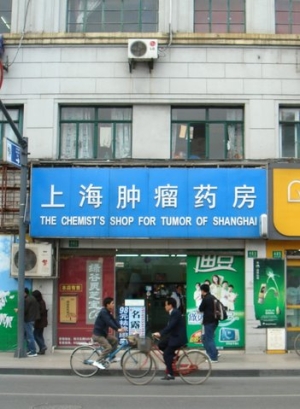
| Bijlage | Grootte |
|---|---|
| Shanghai1.jpg | 105.88 KB |
| Shanghai2.JPG | 94.45 KB |
| Shanghai3.JPG | 108.19 KB |
| Shanghai4.JPG | 92.23 KB |
| Shanghai5.JPG | 49.39 KB |
| Shanghai6.JPG | 104.41 KB |
| Shanghai7.JPG | 84.68 KB |
| Shanghai8.JPG | 72.41 KB |
| Shanghai9.JPG | 74.65 KB |
| Shanghai10.JPG | 77.02 KB |
| Shanghai11.JPG | 68.35 KB |
| Shanghai12.JPG | 64.23 KB |
| Shanghai13.JPG | 106.11 KB |
| Shanghai14.JPG | 69.52 KB |
| Shanghai15.JPG | 94.57 KB |
| Shanghai16.JPG | 72.6 KB |
| Shanghai17.JPG | 37.45 KB |
Shanghai calling - April
02.04.2008
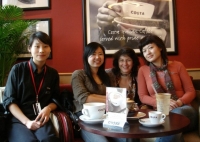
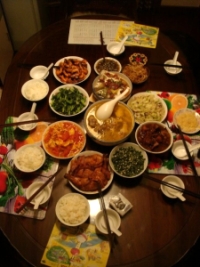
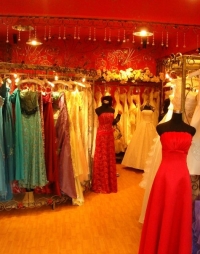
Here I am, a month and two weeks into my stay in China, and still enjoying it. In the meantime, I found full-time work from an unexpected angle, I give private language lessons two evenings a week, I have got two cats and I turned 37 without too much external damage. Many of you have asked you about my daily life here and I can finally say some regularly has slipped in. I have not written very much of late and it was really difficult to finalise this email. But made myself an evening deca espresso to squeeze it out! No more excuses.
So what do I do here? Firstly until three weeks ago I was looking at different options to make a living and getting references and phone numbers from people I met here, but also from many of you guys. So first of all I want to thank all those who took the time to put in a good word for me left and right.
Even if I am not practicing my dream job as a cultural guide as yet, I find myself very well placed preparing for that dream job. I did not end up teaching English or doing cat simulations to Chinese kiddies close to home, but I am working for the Shanghai subsidiary of a Belgian recruitment company. It was set up about 7 years ago and though small it prides itself on a distinguishing high quality of work. My boss is Belgian and all the other colleagues are Chinese. I actually already started working the 10th of March; the day of the second interview as there was so much work to do and I was eager and free to join in then and there.
I live on the third floor, but my office is on the 19th floor and that is a totally different world. From there, at the end of the day, I can see the light of the lights of Yan'an Elevated Road in a big half circle disappearing behind me. As far as the eye can reach the landscape is densely littered by buildings in all shapes and sizes. In this part of town and looking out further toward the West, the high rises have little of the glamour of the buildings in the centre around Renmin (People's) Square or along the Huangpu River, so thank God for the night's forgiving cover of darkness and little bright lights!
Amazingly enough, the windows of this office rise can be opened. This meant that the other night I could not only hear the elevated highway roaring from afar, but also a beautiful sound from just below on the street. It was one of those disorientated and disheveled Chinese men I have seen at other places too, playing a strange metal instrument. The music made me think of documentaries on China, you know the ones with expansive sceneries, mute portraits of century-old looking villagers and the occasional deep and soothing BBC voice-over. It was beautiful to hear…
But I am getting distracted from what I meant to tell: of course I do not get paid to listen to the poetic side of this mega polis! I am going to make myself useful helping to recruit, take over some office management duties to free up the director so he can concentrate on sales and marketing, and thirdly also do some business development.
For the moment I am learning fast-paced and I contribute where I can. My language skills are much appreciated, especially my English. The knowledge of English is defining in recruitment here. Candidates with great professional CV's in bad English have little chance. Similarly the communication to the customers which is in English (only foreign owned and joint ventures) is critical.
As helping to streamline the procedures and communication in the office is part of my roll, I feel I have no choice but to greatly invest in the relationships with my Chinese colleagues. So I took that also as a good excuse to force myself to speed up the language learning process: I am going to be having 4 hours of private Chinese lessons every week. The teacher will be coming to the office after hours, so there will be no escaping. And as my colleagues know this, I'd better pull this off in order not to loose face! So my daily routine now (also a frequently asked question) is getting up at 6AM, 15 minutes Taichi, feeding the cats and preparing breakfast, 6.30 to 7.30AM going for the earlier mentioned morning speed walk with arm-waving with Clara in our green area along the river, 7.30-8AM having breakfast while showering and debating the latest BBC news with the cats, 8.05 dash off to the subway just under 10 minutes walk, 25 minutes of subway and then 15 minutes walk to the office on the other end. The most amazing thing for me in the traveling routine is that I almost never see another expat. I get Shanghai-sandwitched in the metro every morning all my by Western self. I see one other white person every couple of days. The same goes for the morning walk about ground on either side of the subway. It is only if I go for lunch in an European style brasserie (there are a couple near the office) that there is a sudden surge of expat face. They mostly get taxis to get around. It is very surreal.
One of these days I will take my camera to photograph this party of daily life. And you will see that for the most part my Chinese fellow metro-travellers are hiply dressed youngsters with gameboys, cell phones and cheesy magazines in their hands, then queing up at the multitude of little stands serving hot salty breakfasts of fried pancakes and dumpling with meats and vegetables or that delicious sweet red bean paste. I wouldn't miss that matinal hussle and bussle for now. I am not so sure I will still like it when summer will descend on us in her famously moist Shanghai style…
A normal day is from 9 to 6 with one hour lunch. After work there is less routine. Until now, I went out for networking evenings ones or twice a week, teaching English twice a week and now I will need to plan in Chinese lessons too.
Even though I came to learn about art and culture primarily; trying to get to know the people has been taken up all of my time. It is such a classic, but it is true for me too: every time you think you have the hang of it or you understand something; you need to retrace, re-evaluate and wipe you nose cause you bumped into something pretty hard. This week was the first one I felt a bit of weariness from all the bumping. Or maybe it was the Chimay Blue at the beautiful Hamilton House restaurant, where by chance Belgian Django Reinhardt was playing his magic, that triggered soulful moments in Brussels? I had just been to the monthly mixer (standard expression for the monthly Chamber of Commerce drinks) of AmCham (American Chamber of Commerce). I was the last one standing with two elderly gentlemen, one Austrian and one American both married locally, both living in China since for ever and fluent in Chinese. We decided to pursue our conversation over dinner and a bit to my surprised we talked a lot about dealing with Chinese people. It seems that both new and old expats find that many challenges simply don't go away. I am very lucky to have a lucid boss who coaches me patiently through the rocky coast line with China. I am so glad that at least everything that has to do with eating is always simple for me here – I like almost everything and regularly venture out on my own with or without English menu.
There are so many levels of understanding and misunderstanding between Chinese and expats here. Arrogance and naked ambition both parties accuse each other of and at the same time they want and need each other and can make a good pot of money of each other. Chinese people prefer working for foreign owned companies. They find these companies better organised, more efficient, less corrupt and still, with more opportunities. At the same time they equally search new jobs, because in most cases foreign management in China are said to constitute glass ceilings for Chinese employees.
So the West in China is a bit of a catch 22 for many. A good example is one candidate who told me that in every company he worked for where the expat management left to be replaced by a local manager, chaos ensued and many people left. Chinese management however is not necessarily the problem in itself. As another candidate explained me, referring in this case to himself and why he left his position as a General Manager. He had started a job in a plant far away from his home province, which is not at all unusual in China, and had not been accepted by the local workers. So animosity or adversity to foreigners need not limit itself to skin colour or country. Language is equally Chinese problem. Certainly not everybody in inland China masters Mandarin very well and so communication amongst Chinese can be a very real issue.
Anyway, luckily most people I meet, don't remind me of what I just read in the metro on the way back from work in a book on Shanghai: the colonials had built the beautiful park on the Bund bordering on the Huangpu river in 1866 to complement the construction of the Garden Bridge. They place at the entrace the mention "No entry for Chinese and dogs".
I will leave it at this otherwise this email will never get sent. There is as always so much more to write but my head is just to full to properly process it. I will just have to go more often to have massages like tonight to be rested and relaxed to write more often.
Greetings from Shanghai,
bxl71 & Bibi & Sasha
More pictures:
Some daily life:
>Lunch buffet at the Royal Meridien, the cat monsters,
>my language exchange friends in the Costa Bar that saved me from freezing in the first weeks in Shanghai! Lynn, Louise and Flora
>a trip to wedding outlet in Suzhou a city near Shanghai. http://www.facebook.com/album.php?aid=31527&l=e7370&id=721010856
>A weekend trip to the famous city of Hangzhou where Clara took me for a four hour hiking trip meeting people once or twice while all the (mostly Chinese) tourists toured the Westlake below): http://www.facebook.com/album.php?aid=29616&l=974e5&id=721010856
http://www.facebook.com/album.php?aid=29615&l=79916&id=721010856 Birthday party: http://www.facebook.com/album.php?aid=31528&l=915f8&id=721010856
| Bijlage | Grootte |
|---|---|
| Shanghai1.jpg | 28.11 KB |
| Shankhai2.jpg | 48.94 KB |
| Shanghai3.jpg | 47.65 KB |
Hangzhou tea mountains
13.03.2008
Dit is in de buurt van de beroemde en met (Chinese) toeristen (en hun auto's en bussen) overrompelde stad. Longjing is beroemd om zijn groene thee. Tijdens de vier uur durende wandeling zijn we tweemaal mensen tegen gekomen. Ik had het gevoel in bergen tussen Congo en Rwanda (ook beroemd om zijn thee) te zijn.
| Bijlage | Grootte |
|---|---|
| Mountainwalk1.JPG | 56.92 KB |
| Mountainwalk2.JPG | 31.7 KB |
| Mountainwalk3.JPG | 41.46 KB |
| Mountainwalk4.JPG | 60.3 KB |
| Mountainwalk5.JPG | 60.84 KB |
Hangzhou sfeerbeelden
13.03.2008
| Bijlage | Grootte |
|---|---|
| Hangzhou1.JPG | 64.42 KB |
| Hangzhou2.JPG | 108.23 KB |
| Hangzhou3.JPG | 60.14 KB |
| Hangzhou4.JPG | 72.62 KB |
| Hangzhou5.JPG | 67.02 KB |
| Hangzhou6.JPG | 81.44 KB |
| Hangzhou8.JPG | 73.29 KB |
| Hangzhou9.JPG | 79.05 KB |
| Hangzhou10.JPG | 71.85 KB |
| Hangzhou11.JPG | 81.47 KB |
| Hangzhou12.JPG | 91.29 KB |
| Hangzhou4.JPG | 72.62 KB |
Morning walks, food and factory in Shangai
05.03.2008
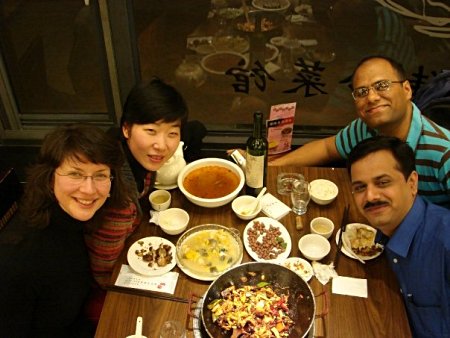
Freezing toes, freezing hands, but a big smile: that's me in China. Though the sun appears often enough, spring has a tough time making a full blown appearance.
My now daily morning walks with Clara have been mostly been blessed with beautiful sun light (not a given in this smog-city), but we wear gloves, a fleece, and I add a hat to that. You will see from the pictures that this is one of the best moments of the day for enjoying the cutting edge architecture and meticulously kept parks and flower beds of Pudong (the East (dong) side of the Huangpu River).
At seven in the morning, there is minimal traffic and office workers only start to appear in great numbers by eight. The people out at seven are the mostly elderly street cleaners, traffic wardens and peddlers. This must be the place, by the way, where I have seen the greatest number of people in one or the other uniform.
I have not quite acquired the elegance of the mostly elderly people (sorry but I will use that qualification quite a bit, they really stand out for me) that exercise along the broad side walks, but I do try to join the culture of morning fitness best I can. It actually suits me perfectly, as I have been doing exercises in the mornings for a very long time.
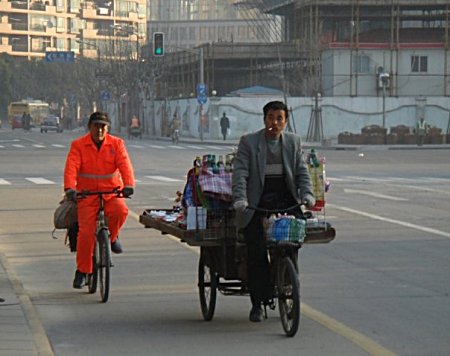
Of course the sight of these small and nibble people right next to towering sky rises, is a sight to behold. In a way, it is very powerful. No amount of steel and glass, no number of chauffeur-driven Audi's, rushing young suits or noisy high heels seems to impress these healthy minds. Just one more thing that makes you wonder who in our modern societies is "advancing" or "right".
Of the few people we encounter, only one person on our morning walks greets us; a middle-aged Chinese-looking man with a lovely smile who we always meet at about the same flowerbed. According to Clara he must be a foreign born Chinese or have lived abroad as this is very un-Chinese behaviour.
One thing I love and hate about the side walk is the middle of it. It has a pattern in brick to guide the blind, which is great of course, but it is very unpleasant to walk on. And as it is quite broad it is difficult to avoid. But it is a reminder for me that it is hard to ignore the many initiatives taken to better people lives. Every time I pick the China daily or Shanghai daily I read a great many articles that seem to point at environmental, health and anti-corruption actions. I came here with a very sceptical mind about the honestly of governmental initiatives, but maybe I should not be. I have probably not been here long enough to assess the news correctly. What is certain is the amount of energy that goes into the promotion of good actions. The word "harmony" seems to feature excessively (to my sceptical Western taste in any case) in these articles.

On the other hand, there is nothing "communist" about the articles of the "civilized" problem of obese children. There are already special institutions in Shanghai to teach these (rich) kids how to eat. Although one wonders if it would not be more efficient to send the parents to an educational seminar. This China I am meeting, or maybe especially seeing as I would not claim to understand it, reminds me far more of America than of Europe. Even the way they drive does; rather slow but in every which way, and in big mostly indefinable sedans of bland colouring.
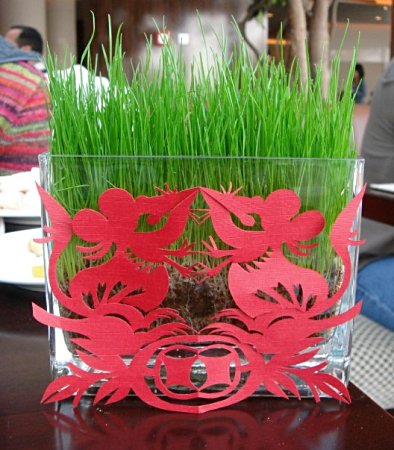
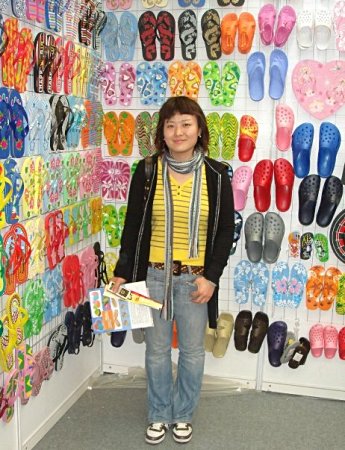

There is so much to tell, but I will not take too much of your time, so let's down to the essential: food! I have expanded my cooking from the exotic vegetables that you saw on the first pictures. I now have dried mushrooms, lotus seeds, dried plums (unlike ours and very much appreciated by the health conscious Chinese) ... and other items I have no name for in English. My kitchen is filled with beans, seeds, herbs, dried veggies, chillies, ginger, garlic ... they are meant to into soups, make tea, and sweet desserts sauces ... Quite a change from my fully stocked fridge and spice cabinet in Brussels. Not surprisingly however Clara says that would I cook is very good but not really Chinese. No worries, I don't mind putting my own mark on Oriental cooking.
In the beginning of this week I left Shanghai for the first time. I drove with Clara out to her factory (co-owned with the manager who is also the main artisan) 250KM north west of here. The drive there was disappointingly boring. I did not know four hours driving could be done through much the same landscape all the way through. New housing on flat land that was littered with electricity poles. But the road was in an impeccable state and so was the toll system. It was not a cheap ride: € 30 for 500km.
I was lucky because the occasion was the yearly feast meal with Clara at the factory. The factory manager had very considerately bought KFC and cokes for me in case I did not like their food. Luckily Clara explained them that I enjoyed Chinese food very much and I was allowed to eat the delicacies that kept on coming in. I have rarely sat at a table where there was so much enjoyment and sharing. Maybe I am misreading the behaviour but the atmosphere seemed to be one of a real team without anything of sloganesqueness that I have heard in Europe and the US. My few words of Chinese where very appreciated (of course all my words refer to good, very good, yes, ok, I have no idea what bad, ugly or disgusting are in Chinese).
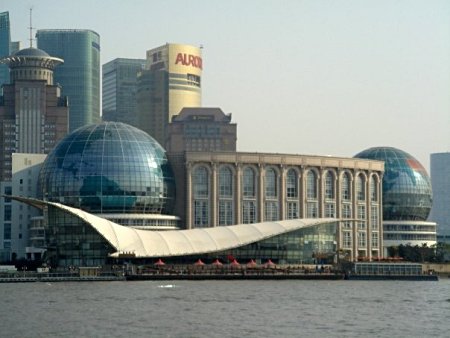
It was hardly like the hyper modern fibre glass factory that I visited in Europe, but this is nevertheless high quality Christmas decoration business. So next you guys visit a big mall in Europe, the States or Australia, the Santa's, reindeer or giant Christmas trees could well be from this factory or a supplier of Clara's (Wijnegem Shopping centre near Antwerp, and a giant tree in Brussels' centre for example).
The workers get paid by the piece that they mould, paint or whatever part of the chain they are involved in. So some arrive at 5am to optimise their earnings. They all work seven days a week. One of ladies, the elderly cook, is actually very wealthy (her house is on the pictures, like a small Las Vegas palace), but she is in the factory every day. This smiling ball of energy (in the pictures with me with short grey hair) for sure bore no resemblance with a fading TV watching potato couch.
I would like to say that working seems to be state of mind in China, but of course there are also the super wealthy kids who do little else than spend their parents money.
The only thing that made me a little uncomfortable during the visit, and I had read about this, but it is still caught me by surprise, was actually my friend Clara. During the lunch she translated my words to the others and let me know what the factory members wanted to say to me or said amongst themselves. Yet the length of what was said was never the same as the translation and sometimes Clara simply did not translate.
From what I read in my home work reading before leaving Belgium about cultural encounters in China, well-meaning translators use their own good judgement in deciding what to translate and how to do this. I can only conclude that it is probably for the best that my Chinese is still virtually non-existent as there was much that went untranslated during lunch! And still I apparently offended the workers. Clara told me the next day that I should not have photographed them working. Their giggling and smiling waving that I understood as friendly and approachable, was apparently sheer embarrassment. They would have liked to been photographed in neat clothing.
Clara took that opportunity to also point out that she really does not like to be photographed, so I promised not make pictures of her anymore. Smiling protests that in my understanding usually originate from shyness or vanity are to be taken seriously here. And so we too, get to know each other better.
... And I am getting better at ping pong, and thought beating my athletic friend will not be for anytime soon, she decided she will no longer be gentle with me!
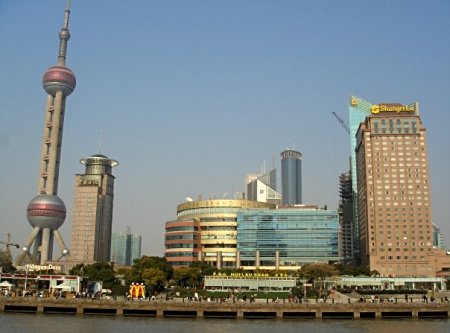
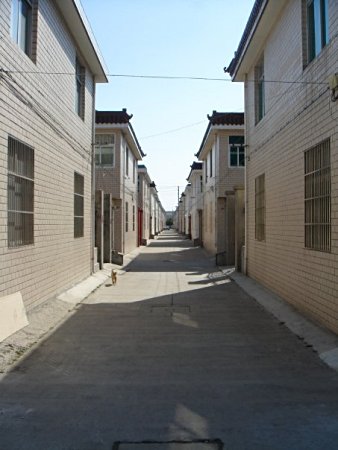
This afternoon was the first time I finally went on a tourist excursion. After an hour of Chinese in the Costa bar with Flora (one of language exchange partners) we headed for the Eastern shore of the Huangpu River to admire the famous architecture of the beginning of the century on the opposite side. The buildings are a reminder of when Shanghai was, I guess much as now, a place to be partying, be artistic but equally commercial. We boarded a little cruise ship to float up and down the river and so could also admire the pretty spectacular eastern shore, as well as the industrial looking north side of the river. Thank God for huge bill boards, otherwise the sight would have been just too lovely ... now I just need to repeat this at night when glittery Shanghai is at its best.
Oh, I forgot to mention that my demo instruction at the Kindergarten closeby (where I made it to the second round of interviews) was commented as "disquieting in the beginning but not bad in the end and the first time the four to five year old Chinese kids learning English were actually not chaotic with a new teacher". I talked to them about Clara's new cat, White Chocolate, and apparently did a good impersonation in which they joined me with great enthusiasm. Thanks for the three years of evening acting school in London ...and a great deal of humility at the right moment!
Good night, good morning or good afternoon,
bxl71
--
Lujiazui Pudong, Shanghai
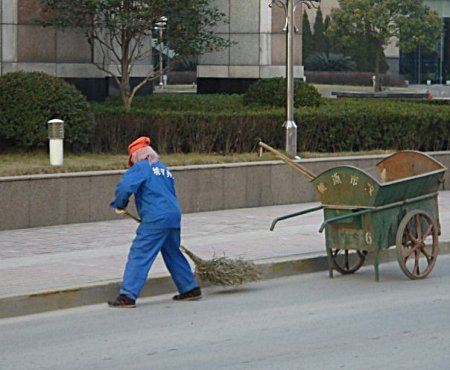
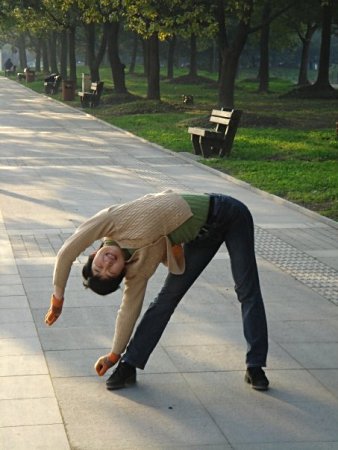
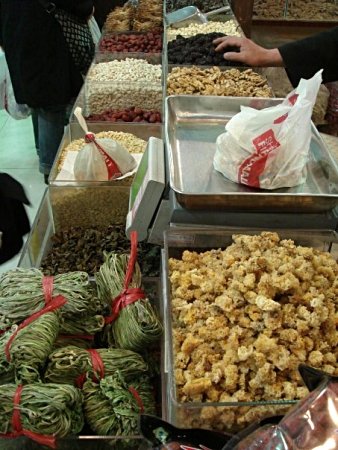
| Bijlage | Grootte |
|---|---|
| aantafel.jpg | 39.03 KB |
| fietsers1.jpg | 34.5 KB |
| food1.jpg | 36.67 KB |
| gras1.jpg | 49.42 KB |
| schoenenwinkel.jpg | 56.92 KB |
| stadszicht1.jpg | 39.21 KB |
| stadszicht2.jpg | 30.84 KB |
| stadszicht3.jpg | 29.83 KB |
| straat1.jpg | 30.65 KB |
| straatveger.jpg | 36.79 KB |
| turnen1.jpg | 33.16 KB |
| veelfood1.jpg | 50.92 KB |
Sfeerbeelden Shanghai
29.02.2008
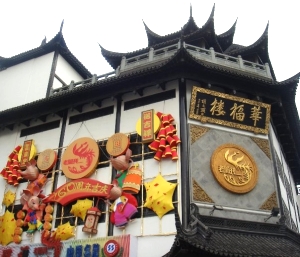
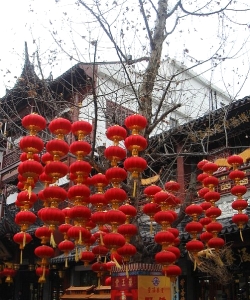
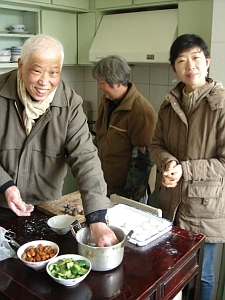
| Bijlage | Grootte |
|---|---|
| n721010856_652121_740.jpg | 66.41 KB |
| n721010856_652124_1847.jpgn721010856_652124_1847.jpg | 80.18 KB |
| n721010856_652820_4982.jpg | 63.9 KB |
First days in Shanghai
28.02.2008
Dear all,
As I am very busy looking for work and getting to know this fascinating place, I have not yet had the time to write up all my experiences.
I have spent an adventurous week under guidance of my Chinese friend Clara, meeting her parents, the city and her friends. When on my own,
I learn Chinese and look for a job. I have found three Chinese people whom I teach English and Dutch and they help me with my Chinese in exchange (otherwise it is impossible to learn the pronunciation correctly).
After now one week in China, I can say that I have been in a culinary heaven, I have had a first job interview today, I can say some basic sentences and counting in Chinese, and I find them overall very friendly, efficient, and hard working.
Although my decision to come here was taken almost overnight, the desire to come to China is a longstanding one and I am not disappointed so far. All that said and done, I still have to meet the "real" China. In many ways, I am merely spending time in a gateway area between an hyper modern world and what lies beyond: a rich ancient culture peopled by often desperately poor human beings. You get a whiff of it, when seeing the darker- skinned peddlers in bleak clothing in Shanghai on their old bicycles carrying all kinds of goods or cooking up the fried breakfasts and lunches that are eagerly eaten by the city dwellers. Those seem to be the very few people that still loudly spit in public.Or when in the morning, around 6 or 7am, you walk past the older people exercising by doing very simple aerobic movements, taichi, or when entering one of the many covered fresh markets, where near perfectlooking (and delicious) vegetables and live fish, chicken and ducks get sold.


